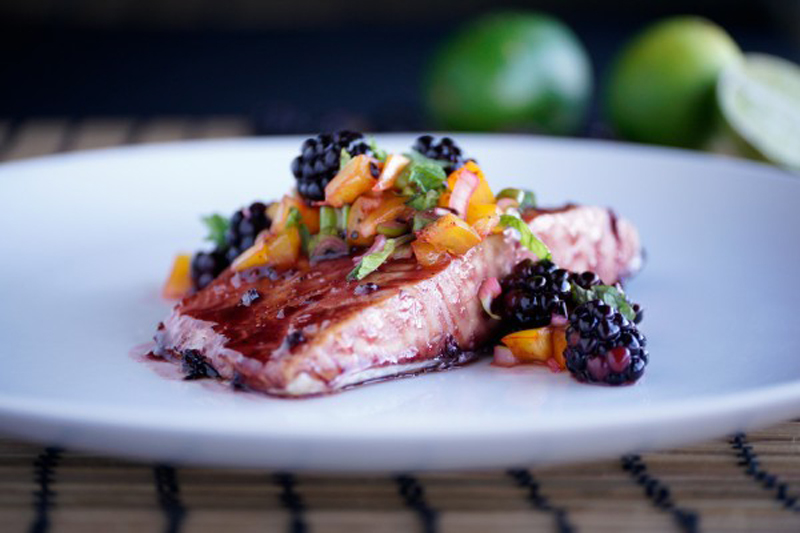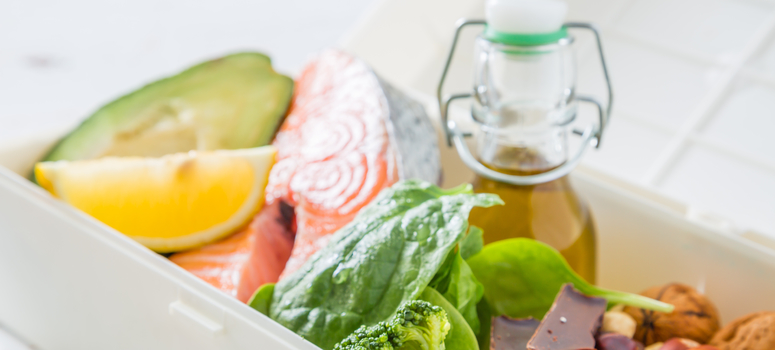Recipes | Wellness Wednesday
03 Apr 2017 / NAFCWellness Wednesday Recipes - April 2017 | Ed 1
Blackberry Salmon Recipe
By Tammy LeBoss | thefitprofoodie.com

A Tasty Journey to the Pacific Northwest
Are you in a cooking rut? Perhaps it’s time to get fancy-shmancy! This recipe will impress your friends and tantalize your tastebuds. Have you ever wanted to try to make a gastrique sauce? This blackberry salmon recipe involves making a delicious sauce called a gastrique. Basically, a gastrique is a fancy French word for a sweet and sour sauce. But don’t let the fancy gourmet name fool you. This sauce is easy to make, unpretentious, and full of flavor.
Food can be transporting. What’s fun about eating this dish is it’ll transport your taste-buds to the Pacific Northwest where some of the world’s freshest fishes are harvested and enjoyed. Be sure to buy wild-caught salmon as they tend to be higher in Omega-3’s, and better for us. A four-ounce serving of salmon or other fishes high in Omega 3’s two or three times a week will supply a beneficial dose of omega-3 fatty acids for most people. This recipe calls for salmon as the main protein, but this blackberry sauce will also compliment the flavors of pork, duck or chicken.
Wild Blackberries are also indigenous to the Northwest where the tastiest ones are ritualistically hunted for and enjoyed. The sauce for this recipe is made by boiling down blackberry puree, red wine vinegar, red wine, and sugar. Keep a jarred supply stored in the fridge and add to healthy dishes to be enjoyed throughout the week. Here’s what you’ll need:
Ingredients (Serves 2 people):
- 2 6oz. salmon filets
- 2 big handfuls baby arugula
- 1/4 red onion, sliced thin
Nutrition tip: Try coconut sugar or local honey as healthier options :)
For that fancy sauce:
- 1 cup red wine vinegar
- 1 cup red wine
- 1 cup blackberries (fresh or frozen) plus about 1/2 cup extra whole blackberries for garnishing
- 1/2 cup raw sugar or 1/8 cup (if watching your waistline)
- Or try coconut sugar or local honey as healthier options
- a pinch of sea salt
To prepare blackberry gastrique sauce: In a saucepan, combine vinegar, red wine and sea salt. Puree blackberries in food processor or blender. Strain blackberry puree into saucepan. Discard seeds/pulp. Bring mixture to a boil. Simmer until sauce is very reduced. Add sugar and continue boiling until sauce is thick and syrupy.
A ‘No Fuss’ Pro Tip: Haven’t got the time to trudge through the forests of the Northwest for blackberries? Try replacing the puree with a blackberry preserve of your choice. About 2 tablespoons should do the trick. If replacing with preserves, remember to remove sugar from the above recipe.
To prepare seared salmon, preheat oven to 350 degrees. Salt and pepper salmon. In an oven-safe saute pan, heat oil on high heat (remember your good oils list. Hint: olive oil isn’t it). Sear salmon for about 2-3 minutes, skin side down first, or until crusty. Transfer to oven for about 8-10 minutes or until cooked to your liking.
To assemble, place salmon over a bed of arugula or mixed greens salad, rice pilaf or garlic smashed potatoes. Drizzle with a generous spoonful of yummy blackberry gastrique sauce. Garnish with thinly sliced red onion and/or reserved blackberries. Boost your flavor profiles as well help your heart and brain health with this recipe and Bon appetite from your friends at NAFC.
Be a friend and share this recipe with those who need to up their Omega-3 intake today!
Recipe by: Tammy@thefitprofoodie.com
Food Recipes | Wellness Wednesday
01 Mar 2017 / NAFCWellness Wednesday Recipes - March 2017 | Ed 1
Best Ways to Optimize Fats
By Tammy LeBoss | thefitprofoodie.com

We’ve all heard about the health benefits of olive oil.
Embraced by many health nuts, ‘good fats’ such as olive oil, fish oil, coconut oil, avocado and walnuts are known to fight inflammation, reduce risk of heart disease, and reduce the likelihood of Alzheimer’s disease.
Many of us cook with olive oil, but did you know that olive oil is only good for us when it’s used cold? Increased heat can increase the likelihood of oxidation. In fact, it's important to realize olive oil is not necessarily good for cooking. Why? Due to its chemical structure and a large amount of monounsaturated fats such as oleic acid, heating olive oil when cooking can turn this good fat into a bad one. To learn more, geek out on science with NAFC’s Nutrition Coach and find out how heat can actually damage certain foods, changing their molecular structure(s) so they’re no longer beneficial to our health.
Concerned about oxidation and rancidity? Try cooking with coconut oil. It is the ideal choice because it’s a vegetable fat stable enough to resist heat-induced damage. Protect your oils from going bad; store foods, namely good oils away from sunlight and heat.
Here are more tips for protecting and optimizing your food oils:
- Keep in a cool, dark place -darkness is key because light will definitely oxidize the fats in olive oil and other good fats;
- Purchase smaller bottles rather than larger to ensure freshness
- Immediately replace the cap after each pour, keeping bottles tightly capped;
- Add olive oil or other healthy oils to foods after cooking.
- Avoid leaving food out exposing it to air; the longer food sits around, the greater the likelihood of oxidation.
The more saturated fat contained in an oil, the less susceptible it is to rancidity.
With respect to light, purchase oils in bottles made from darker-tinted glass. They will usually be dark brown or dark green in glass color. Also, store your oils, almond butter and nuts in a cabinet that is lightproof. With respect to heat, many oils can be kept fresh if stored in the refrigerator where the temperature remains continuously low. To learn more, do your research to understand the chemical composition of an oil. This is will be a key factor in preventing the risk of rancidity and potential health issues. Remember 1 key basic principle involved in saturated and unsaturated fats: The more saturated fat contained in an oil, the less susceptible it is to rancidity. The greater the amount of unsaturated fat in an oil, the more likely it is to become rancid. Remember, fat heals, protects and satisfies us—but only when it’s kept fresh for our stomach and taste buds.
Beyond cooking, trainers need to educate their clients on the many functions of fat once converted and stored in the body. Fat does not make us fat. We need fat to metabolize fat. Consuming good essential fats is necessary for our survival. Learn more on the role of fats and other macronutrients in NAFC Nutrition Coach, Sports Performance and Wellness Consultant today. Stay in the game and keep learning!
Recipe by Tammy@thefitprofoodie.com
August 2016 Newsletter | Article 2
05 Aug 2016 / NAFCNAFC Newsletter
2 Ways to Beat the Summer Heat!
By Tammy LeBoss | thefitprofoodie.com

The heat is here, school is out and the summer games on!
Fun and games can however, become ‘not so fun’ when water intake is overlooked and good oils are turned bad. This summer, be sure to pay extra attention to oil and water—how to properly store, and how much to drink, respectively. Water has been referred to as the 2nd most important nutrient after oxygen. Here’s why it’s critical to our health. Did you know that mild dehydration is one of the most common causes of daytime fatigue? Estimates show that 75% of Americans have mild, chronic dehydration. This is alarming since proper hydration is required for maintaining healthy blood flow, proper kidney function, proper sodium/potassium/electrolyte balance and proper digestive functions.
Water gives us life. Did you know that the human body is comprised of 65% water? Water is necessary for life to exist, makes us healthier and it’s incredibly refreshing especially after a workout. Water is not only the most important nutrient in the body, but also the most abundant. It’s critical to the balance of all the body's systems, including the brain, heart, lungs, kidneys and muscles. In fact, the body needs water for millions of metabolic processes, temperature control, fluid volume, and lubrication.
Can we drink too much water and how much is enough?
When determining how much water is appropriate, consider the individual. How much to drink each day will depend upon a few variables. Drink enough water to replace normal daily losses via perspiration, waste removal, and breathing.
The following factors also contribute to the need for increased water consumption:
- Increased or hot weather
- Increased workload
- Increased respiration
- Increased bowel movements
- Large amounts of caffeine or sugar consumed
NAFC’s Nutrition Coach Course recommends the following rule-of-thumb formula for determining your optimum daily water intake: Consume between 1⁄2 to 1 oz. of purified water per day per pound of body weight depending upon your general activity level and your environmental conditions or surroundings.
This does not include compensation for losses due to exercise or excessive sweating. Add another 6-12+ ounces per 15-20 minutes of exercise depending on how hot it is, the relative humidity, and how much you sweat in relation to others under the same conditions. Although the exact amount of water needed per day is undetermined by scientists, we believe it depends on the individual.

Preventing Good Oils from Turning into Bad
We’ve all heard about the health benefits of olive oil. Embraced by many health nuts, ‘good fats’ such as olive oil, fish oil, coconut oil, avocado and walnuts are known to fight inflammation, reduce risk of heart disease, and reduce the likelihood of Alzheimer’s disease. Many of us cook with olive oil, but did you know that olive oil is only good for us when it’s used cold? Increased heat can increase the likelihood of oxidation. In fact, it's important to realize olive oil is not necessarily good for cooking. Why? Due to its chemical structure and a large amount of monounsaturated fats such as oleic acid, heating olive oil when cooking can turn this good fat into a bad one. To learn more, geek out on science with NAFC’s Nutrition Coach Certification and find out how heat can actually damage certain foods, changing their molecular structure(s) so they’re no longer beneficial to our health.
Concerned about oxidation and rancidity? Try cooking with coconut oil. It is the ideal choice because it’s a vegetable fat stable enough to resist heat-induced damage. This summer, protect your oils from going bad; store foods, namely good oils away from sunlight and heat.
Here are more tips for protecting your food oils:
- Keep in a cool, dark place -darkness is key because light will definitely oxidize the fats in olive oil and other good fats
- Purchase smaller bottles rather than larger to ensure freshness
- Immediately replace the cap after each pour, keeping bottles tightly capped
- Add olive oil or other healthy oils to foods after cooking
- Avoid leaving food out exposing it to air; the longer food sits around, the greater the likelihood of oxidation
With respect to light, purchase oils in bottles made from darker-tinted glass. They will usually be dark brown or dark green in glass color. Also, store your oils, almond butter and nuts in a cabinet that is lightproof. With respect to heat, many oils can be kept fresh if stored in the refrigerator where the temperature remains continuously low. To learn more, do your research to understand the chemical composition of an oil. This is will be a key factor in preventing the risk of rancidity and potential health issues. Remember 1 key basic principle involved in saturated and unsaturated fats: The more saturated fat contained in an oil, the less susceptible it is to rancidity. The greater the amount of unsaturated fat in an oil, the more likely it is to become rancidity.
Remember, fat heals, protects and satisfies us—
...but only when it’s kept fresh for our stomach and taste buds!
1

